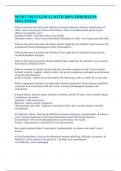MGMT 3302 EXAM 3 || WITH 100% ERRORLESS
SOLUTIONS.
What is motivation & what are the differences between initiation, direction, & persistence of
effort? correct answers set of forces that initiates, directs, and makes people persist in their
efforts to accomplish a goal
Initiation of effort - how much effort to put forth2)
Direction of effort - where to put forth effort3) Persistence of effort - how long to put forth effort
What are the needs associated with Maslow & how might they be satisfied? correct answers Self
actualization Esteem Belongingness Safety Physiological
What are the needs associated with Alderfer & how might they be satisfied? correct answers
Growth Relatedness Existence
What are the needs associated with McClelland & how might they be satisfied? correct answers
Achievement Affiliation Power
What are extrinsic & intrinsic rewards and what are some examples of each? correct answers
Extrinsic rewards - tangible, visible to others, and given to employees contingent on performance
of specific tasks/behaviors
Intrinsic rewards - natural reward associated with performing a task or activity for its own sake
What is engagement and how is it connected to intrinsic motivation? correct answers emotional
connection to & involvement with one's work; a sense of belongingness, purpose, and
commitment
In Equity theory, what are inputs, outcomes, referents, and the O/I ratio? correct answers inputs -
contributions one makes
Outcomes - what one receives
Referents - others used for comparison
Outcome/input ratio (O/I) - employee's perception of how their rewards compare with their
contributions
In Expectancy theory, what are the differences between expectancy, instrumentality, & valence?
correct answers Expectancy- Perceived relationship between effort & performance
Instrumentality- Perceived relationship between performance & rewards
Valence- Attractiveness or desirability of rewards/outcomes
How might someone behave if expectancy, instrumentality, or valence were weak? correct
answers
In Goal-Setting theory, what are the differences between specificity, difficulty, acceptance, &
feedback? correct answers Goal specificity - detailed, exact, unambiguous
Goal difficulty - hard, challenging
, Performance feedback - info on progress
Goal acceptance - commit, understand, agree
in Reinforcement theory, what are the differences between the contingencies of positive
reinforcement, negative reinforcement, extinction, & punishment, and what are some examples
of each? correct answers Positive reinforcement - strengthens behavior by following behaviors
with desirable consequences
Negative reinforcement (avoidance learning) - strengthens behavior by withholding an
unpleasant consequence when someone performs a specific behavior
Punishment - weakens behavior by following behaviors with undesirable consequences
Extinction - reinforcement in which a positive consequence is no longer allowed to follow a
previously reinforced behavior, thereby weakening the behavior
In Reinforcement theory, what are the differences between a continuous reinforcement schedule
& the intermittent reinforcement schedules (fixed & variable interval, fixed & variable ratio),
and what are some examples of each? correct answers Intermittent reinforcement schedule -
consequences are delivered after a specified or average time has elapsed or after a specified or
average number of behaviors has occurred
Continuous reinforcement schedule - consequence is administered following every instance of a
behavior
Fixed interval - consequences follow behavior only after a fixed time has elapsed
Variable interval - time between behavior & consequences varies around a specified average
What is leadership? correct answers process of influencing others to achieve group or
organizational goals
How do managers differ from leaders? correct answers Managers- Short-term
perspectiveProductivity, efficiencyDoing things rightMaintain status quoBuild & controlSolve
problems for othersHow to get things done (means)
Leaders- Long-term viewVision, mission, goals, objectivesDoing the right thingsPromote
changeDesign & expand choices, optionsInspire & motivate others to find solutionsWhat gets
done (ends)
What are the differences between legitimate, reward, coercive, informational, expert, and
referent power? correct answers Legitimate, reward, coercive- Transactional - based on an
exchange process in which followers are rewarded for good performance & punished for bad
performance
Referent- Charismatic - based on behavioral tendencies & personal characteristics of leaders that
create strong relationships with followers




